2025- Support SB3 and Protect Texas Families fom Synthetic THC
This bill will save lives! Use the following information to inform your Texas state legislators. You can also click on this link to download this material. .
Issue
Vape and smoke shops, gas stations, and various retailers are selling hemp-derived THC and its analogues, such as Delta-8-THC, which are synthetically produced from CBD. These products are being marketed as medicine and are being sold to Texas youth, contributing to severe mental and physical health issues and, in some cases, even death.
- Synthetic THC is being sold to Texas children, causing harm and, in some cases, fatalities.
- Any potential tax benefit pales in comparison to the destruction of people’s health and the tragic loss of life caused by these synthetic products.
- The FDA should be the sole governing body responsible for regulating more drugs. The FDA has already approved medications derived from components of the cannabis and hemp plant, specifically Dronabinol (THC) and Epidiolex (CBD). It is important to note that the FDA warns against exceeding a daily dose of 20mg of THC and lists the risks, including hallucinations.
- Even Colorado has banned synthetic THC manufactured from hemp due to the heightened risks associated with its use.
Education
THC is THC, whether it is Delta-8 or Delta-9.
- THC can cause the disease of addiction and can lead to the use of other drugs like fentanyl.
- THC can cause psychosis and progress to schizophrenia.
- THC can lead to death.
- THC can worsen symptoms of PTSD and increase the risk of suicide by up to 7X.
- THC can worsen depression and anxiety, two epidemics threatening Texas children today.
- Cannabinoid hyperemesis syndrome can lead to dehydration, seizures, and organ failure.
Deceptive Products - Targeting Our Kids
Today’s hemp products are intentionally designed to resemble everyday foods, like candies, to target children. Sugary flavors are added to vapes and other THC products to conceal their toxic taste.

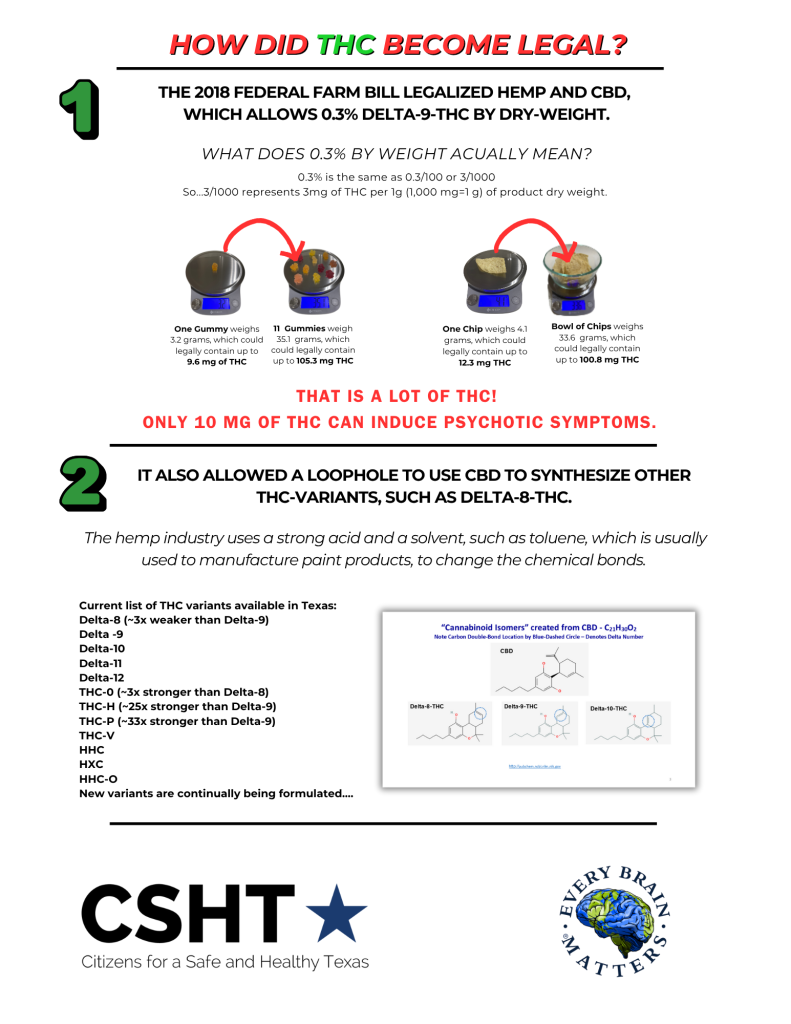
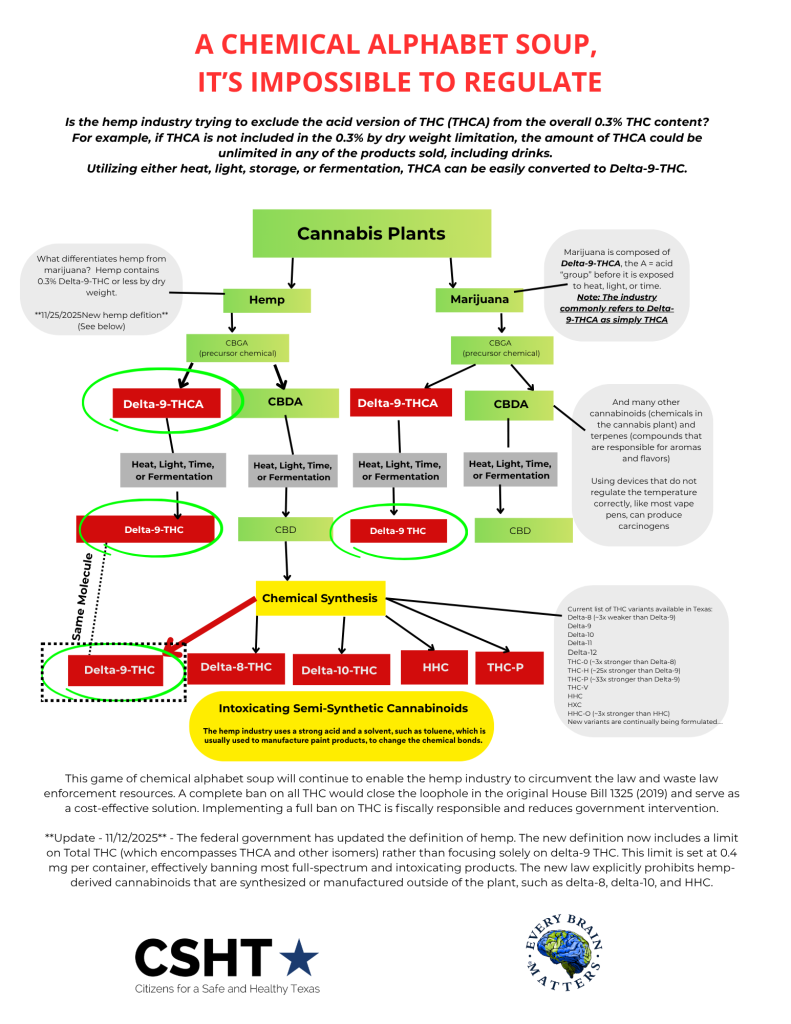


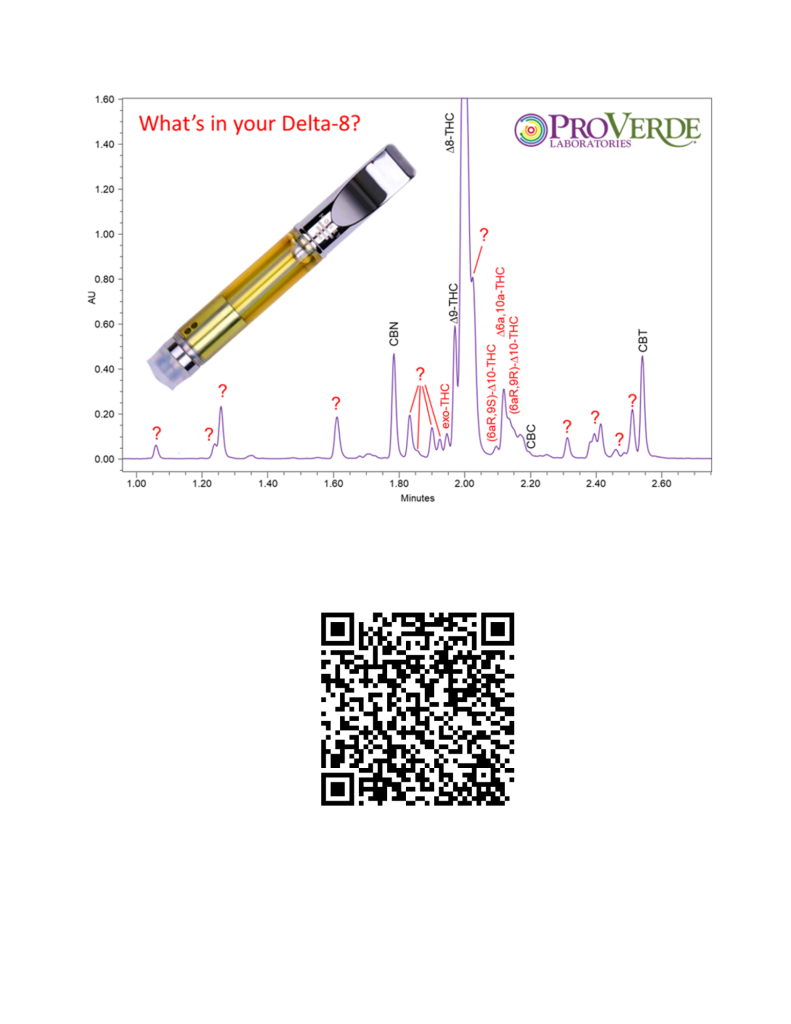
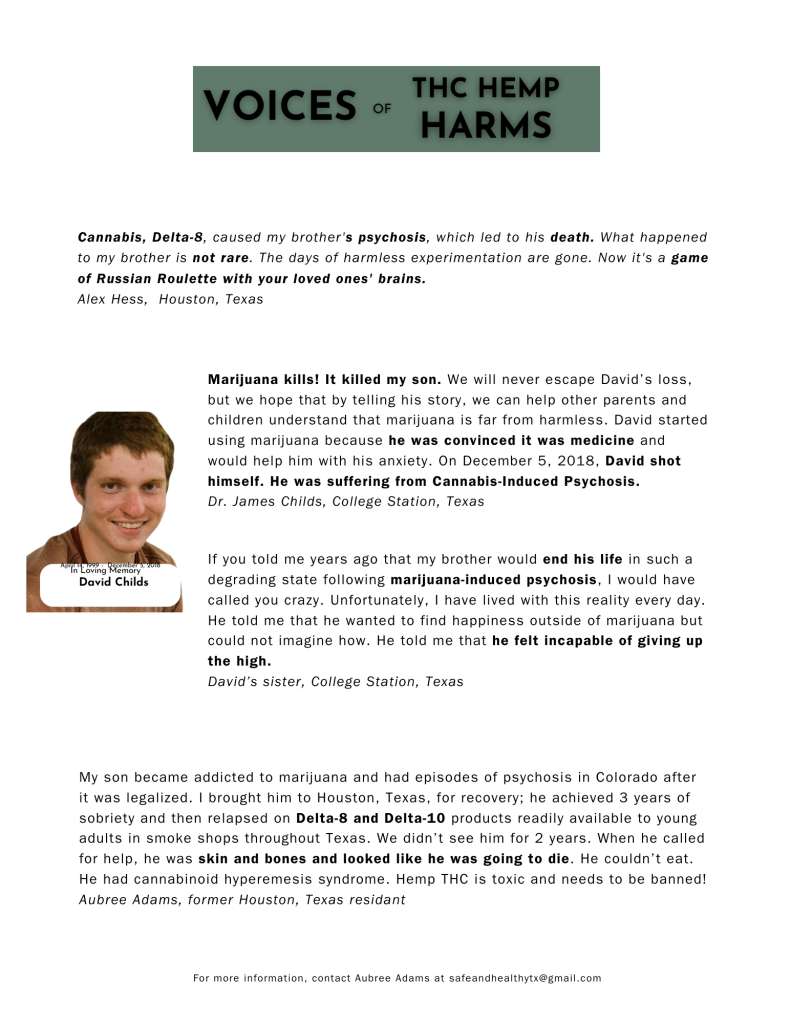
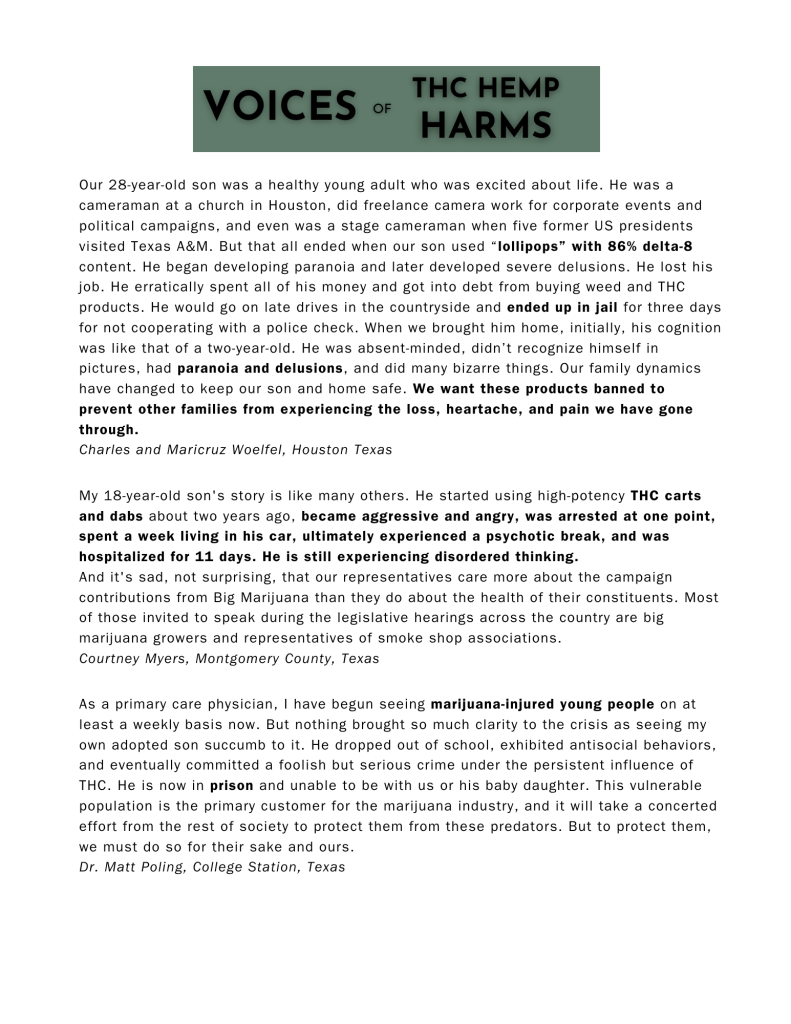
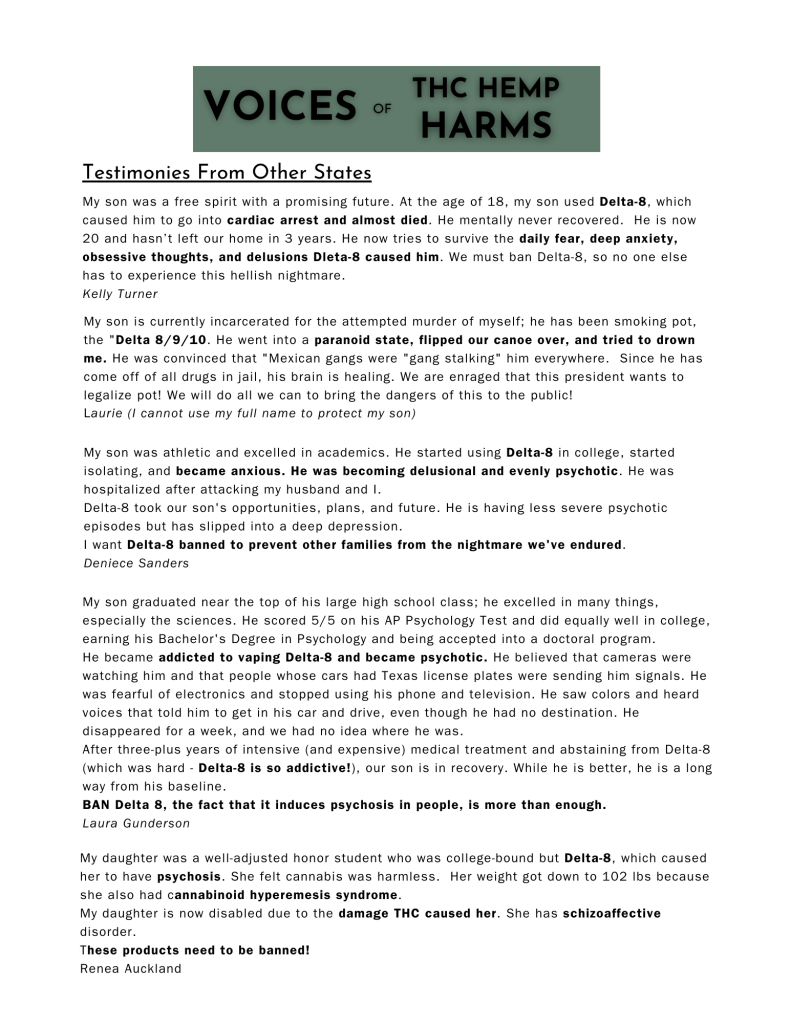
Despite bipartisan support to ban all THC products, Abbott vetored the bill.
He has now called for a special session to regulate THC,
which is a shocking move to legalize marijuana.
This is detrimental to public health and the taxpayers.
Texas legislators must support only one regulation: a full ban on THC!
Contact your leglisaltors Now! Tell them to Pass Senate Bill 5 and House Bill 5!
This is NOT a Ban on Hemp! It's a Ban on THC!
Senate Bill 3 was an enforcement measure to remove illegal marijuana (THC) products and synthetics from being sold and exploited through a loophole in House Bill 1325 of 2019. If Governor Abbott legalizes THC, he will effectively reward the people selling these products with the right to profit from harmful intoxicants that endanger the health and safety of Texas families and communities.
The only fiscally responsible way forward is a full ban on THC; otherwise, Texas will need to exponentially expand its government and use taxpayers’ money to manage an industry that has already proven problematic, with dangerous products and predatory marketing tactics.
Regulations with THC in other states have failed and are associated with increased use across all age groups, including underage youth, even when age restrictions are in place. This is a critical fact that is backed by our experience with alcohol and tobacco, the two most heavily regulated legal substances. Despite 21+ age limits, they remain the most commonly used substances overall and among youth.
Furthermore, THC is a lipophilic, fat-soluble compound, and it accumulates in the system, especially in our brains. As little as 10 mg can induce psychotic symptoms. If a person consumes 3 mg daily, THC will accumulate in their brain receptor sites, and we cannot predict when the brain might become dependent or break into psychosis.
This is one of the main reasons why THC cannot be safely regulated or controlled.
There is an FDA-approved THC medication called Marinol. It is recommended to initiate treatment at 2.5 mg twice daily for a short duration. Physicians are cautioned not to prescribe more than 20 mg per day due to the risk of psychotic reactions. Is Abbott going to include all these recommendations and warnings on each product and allow the hemp industry to impersonate medical professionals? Or is he truly aiming to legalize THC for recreational use?
Please connect the dots. The homeless people you see on the streets of Austin suffering from psychosis are THC-related, and in many circumstances, it is the cause.
- 47% of people (adults) who experience cannabis-induced psychosis will convert to a chronic psychotic disorder, such as schizophrenia or bipolar disorder with psychosis.
- 30% of young men, ages 21-29, would not have developed schizophrenia if it weren’t for their cannabis use disorder, addiction to THC. This analyzed detailed health records data spanning 5 decades and representing more than 6 million people in Denmark, where they have low potency marijuana (products under 10 mg).
Read this sciencetific study for health policy expert, Dr. Matthew Rossheim https://txsdy.org/wp-content/uploads/2025/05/rossheimreport.pd
🚨 Misinformation from the THC Industry
We urge legislators to see past the industry’s marketing spin.
“No one has died from THC” – A lie by omission. This narrative is just as misleading as Big Tobacco’s assertion that “no one dies from nicotine”. Here’s the truth: marijuana-related deaths are not effectively systematically tracked. People often die from THC-related violent and neglect incidents, drug overdoses, suicides, CHS, ingestion of edibles, road fatalities, heart attacks, and strokes.
Texas children who died from abuse and neglect
- The Texas Department of Family and Protective Services confirms that marijuana (THC) is the most common drug used by perpetrators in child abuse and neglect deaths. (2023 DFPS Fatality Report, P. 21)
Drug overdose deaths
Suicides: Cannabis use was associated with a higher rate of suicidal ideation and attempts in various populations, including bipolar and major depressive disorder patients, military veterans, and the general population. Evidence for a causal relationship was mentioned in one study for suicidal ideation. Additionally, some studies showed that heavy and long-term cannabis use was associated with worse suicidal outcomes.
Acts of Violence: Here is a list of violent incidents and mass shootings associated with cannabis (THC)-induced psychosis.
Cannabinoid Hyperemesis Syndrome can lead to dehydration and electrolyte imbalance, leading to fatal seizures and organ failure.
Ingestion of edibles can cause severe respiratory depression or cardiac arrest.
- Tanner Clements died from THC after consuming half of a CBD edible belonging to his mother.
- East Texas women charged after toddler overdoses on THC.
- A Texas man who allegedly gave his daughter THC chocolate, sending her to the hospital.
Road Fatalities: The combined effect of legalization and retail sales was a 5.8% increase in injury crash rates and a 4.1% increase in fatal crash rates
Heart Attacks and Strokes: The Journal of the American Heart Association found that ANY use of marijuana was linked to a high risk of heart attack (25% increase) and stroke (42% increase).
“Marijuana is safer than alcohol.”
A single shot of alcohol does not cause psychosis like a hit of THC can. Also, alcohol is a water-soluble drug, so people experiencing harmful effects usually recover within a few hours; however, THC is a fat-soluble drug. The detrimental effects, like psychosis and cannabinoid hyperemesis syndrome, can be long-lasting.
“Using Marijuana is about freedom,” –
There is no freedom when an industry gets a free pass to deceive. Freedom is compromised when companies intentionally withhold or distort information that affects informed consent (Engle v. Liggett Group). Moreover, using marijuana can lead to serious issues that cause suffering, such as addiction, psychosis, and physical sickness. THC is the primary environmental factor that can lead to schizophrenia, a chronic psychiatric disorder that is associated with crime, homelessness, and reduced life span.
“THC is medicine.”
The hemp industry must stop making false medical claims until its products receive approval from the FDA. Making unsubstantiated medical claims is considered a deceptive trade practice under Chapter 17 of the Texas Business and Commerce Code, specifically the Texas Deceptive Trade Practices–Consumer Protection Act (DTPA). Claims such as “this cures anxiety” or “treats PTSD” may lead to accusations of unauthorized practice of medicine, which is a violation of the Texas Occupations Code Chapter 151. Additionally, products that make medical claims without FDA approval are classified as misbranded drugs under the Federal Food, Drug, and Cosmetic Act. The THC industry does not adhere to these regulations nationwide.
📌 Real Stories, Real Consequences
Bryn Spejcher, a 28-year-old woman with no criminal record stabbed her friend over 100 times during a cannabis-induced psychotic episode, ending his life. She also stabbed herself over 40 times, but police intervention saved her life. The woman was convicted of involuntary manslaughter. THC caused the psychotic break that led to this horrific crime.
A 15-year-old Houstonian ate “a bunch of edibles” and then called 911, threatening to kill himself or a family member. He shot his mom and sister multiple times. They were in critical condition. Police said the boy, one of his sisters, and an adult ate the THC edibles. The suspect reacted badly and called for an ambulance, while the others tried to calm him down. They also began to laugh at him, which prompted him to get the gun, police said.

I am a Texas mom. My son’s father, Isaac, loved marijuana more than our son, Jesse, and moved to Colorado to support his marijuana addiction. By law, I had to send my son to visit his father in Colorado, even though I was reluctant to. On Jan. 22, 2020, Issac was so impaired from marijuana dabs that he forgot to put my baby in his vehicle and drove over him in his driveway. He felt the truck bounce, but instead of calling 911 to help my son, Issac called his drug buddies to help conceal his illegal marijuana operation in his home, where the marijuana plants took up most of the house while my baby slept in a cardboard box on the floor with no heat. Issac didn’t want the death of Jesse to get in his way of selling tax-free marijuana from his home and his dream to be a Pot King.
My son is dead because Colorado allows marijuana to be grown in communities and promotes its use. Jesse would still be alive if it weren’t for his father’s marijuana addiction, which led to my son being abused and neglected. If Texas legalizes marijuana, it will be like a slap in my face. How can any state pick more marijuana over the health and safety of our children?
Tamlin Nichole Oliver, Quinlan, Texas

Marijuana kills! It killed my son. We will never escape David’s loss, but we hope that by telling his story, we can help other parents and children understand that marijuana is far from harmless. David started using marijuana because he was convinced it was medicine and would help him with his anxiety. On December 5, 2018, David shot himself. He was suffering from Cannabis-Induced Psychosis.
Dr. James Childs, College Station, Texas
If you told me years ago that my brother would end his life in such a degrading state following marijuana-induced psychosis, I would have called you crazy. Unfortunately, I have lived with this reality every day. He told me that he wanted to find happiness outside of marijuana but could not imagine how. He told me that he felt incapable of giving up the high.
David’s sister, College St
💸 A Smarter, Smaller Government
Regulations are costly! A FULL THC BAN is fiscally responsible and minimizes government intervention.
Texas’s failed regulation proves this industry only grows government, wastes resources, and harms public health:
• Bureaucracy Bloat: DSHS, TDA, TABC, DPS — multiple agencies, more costs, and still no control. A ban simplifies enforcement and cuts waste.
• Healthcare Costs: High-potency THC drives ER visits, psych care, and addiction treatment — all on the taxpayer’s dime.
• Oversight Waste: Tracking systems, inspections, labs, lawsuits — endless taxpayer spending to manage a predatory industry.
• More Government, Not Less: Regulation expands government jobs, taxes, and bureaucracy just to manage addiction.
Bottom Line: A ban reduces government spending and prevents the waste of resources on an industry that Texas clearly can’t control.
💀 Costs:
- Health Harms from THC use
- Legalization is associated with increased use across all age groups, including underage youth – even when age restrictions are in place.
- The estimated cost burden of schizophrenia in the U.S. doubled between 2016 and 2019, reaching a total of $343.2 billion.”
- ER visits for CHS
- Legalization of cannabis, both medical and recreational, has been associated with increased cannabis use among young people and a higher prevalence of cannabis use disorder, according to the Recovery Research Institute
- Cannabis increases the risk of other substance use disorders
- Lost productivity
- Suicide
- Substance use disorder and homelessness
- Mental illness
- Cost of cannabis use disorder
- Law enforcement and criminal justice
- Costs of medications
- Underground black market expansion
- Burden on schools, youth services, and CPS burdens
- Workplace safety costs
- Environmental damage from cultivation
- Legal costs: fraud, consumer protection, litigation
A full ban on THC is fiscally responsible. It is much cheaper than a complex regulatory regime, which the industry will continually evade, and more THC use will lead to enormous downstream social costs, which the taxpayers will ultimately bear.
Texas House of Representatives Public Health Comittee HB5
Dear House of Representatives Public Health Committee, 8/14/2025, updated 8/15/2025
Thank you for your time and attention during the committee hearing on HB 5. Several families, including mine, shared our experiences with the committee regarding the harm THC has caused our loved ones. However, we are deeply concerned by the misrepresentation made by pro-THC advocates who publicly belittled and slandered our families and failed to address the scientific facts about the risks of THC use. I understand that it is common for individuals who cannot argue with facts to resort to personal attacks.
As a family that has already paid the emotional and financial costs resulting from THC legalization and normalization, I want to provide the following information to clarify some misinformation.
First, it is essential to understand that there are three different types of drug policies:
- **Drug Prevention Policies**: These policies discourage drug use and reduce associated harms through education and consequences. They help decrease government spending while protecting the health and safety of individuals and communities.
- **Drug Promotion Policies**: These policies allow the industry to profit from the commercialization and normalization of drugs, leading to increased use and harm. An example of a drug promotion policy is legalization, which expands government involvement with regulations.
- **Drug Recovery Policies**: These policies provide funding for resources that assist individuals in recovering from drug use. As a state or country legalizes more drug use, lawmakers will need to expand government efforts to address the resulting harms from policies that promote drug use.
While legislators had good intentions in legalizing hemp for agricultural purposes, as you know, this created a significant loophole that has paved the way for the legalization and normalization of marijuana (THC), a drug-promoting policy.
I want to address some key concerns raised by the committee with the latest research.
*Even as little as 2 to 3 mg of THC can be intoxicating.
*Additionally, a dose of 10 mg of THC can lead to psychotic symptoms in adults.
*THC is a lipophilic, a fat-soluble compound that accumulates in the body, particularly in the brain. For instance, if a person consumes 3 mg of THC daily, it can build up in their system over time, increasing the risks of addiction and psychosis. This accumulation is one of the primary reasons why THC cannot be safely regulated or controlled, nor can we predict who may become psychotic after usage.
*What we do know is that the higher the potency of THC, the more frequent the use, and the younger the brain, the greater the risk. No amount of THC is safe for people under 25 years old to use, and there is no proof that THC is safe for adults to use.
For example, Bryn Spejcher, at the age of 28 years old, experienced a severe acute episode of cannabis-induced psychosis resulting in violent behaviors and death. Bryn stabbed her friend, Chad O’Melia, over a hundred times, ending his life, and stabbed her dog. Bryn was stabbing herself when the police arrived at the scene. They tased her 4 times, but were unable to stop her from harming herself. So they hit her with a baton 9 times, breaking bones, to successfully get Bryn to drop the knife. Bryn, at this point, had stabbed herself over 40 times.
The prosecution and defense experts all concluded that Bryn had CIP, cannabis-induced psychosis. She was convicted of involuntary manslaughter and is under a court order to provide 100 community public education hours about cannabis-induced psychosis. Bryn’s probation officers approved me to supervise these public service hours.
*While some people advocate for personal freedom to use THC, scientific evidence proves that THC is the primary environmental factor in the development of schizophrenia, a state of suffering and disability. https://www.medicalnewstoday.com/articles/how-do-you-get-schizophrenia#environmental-triggers
*It is also concerning to hear Governor Abbott state that he wants to regulate THC like alcohol. It is essential to note that a shot of alcohol does not cause psychosis, like a swallow or a hit of THC can. Alcohol is a water-soluble drug, so people experiencing harmful effects usually recover within a few hours; however, THC is a fat-soluble drug. The detrimental effects, like psychosis and cannabinoid hyperemesis syndrome, can be long-lasting.
The Canadian Medical Association Journal. People with cannabis-induced psychosis are at a 241.6-fold higher risk of developing schizophrenia.
A study published in Psychological Medicine, which analyzed comprehensive health records spanning five decades and involving more than six million people in Denmark (where low-potency cannabis is available), estimated that as many as 30% of schizophrenia cases among men aged 21-30 might have been prevented by avoiding cannabis use disorder.
Another study published in the American Journal of Psychiatry looked at 6,788 patients diagnosed with a drug-induced psychosis from the Danish Civil Registration System and the Psychiatric Central Research Register over 20 years. They found that the patients with cannabis-induced psychosis had the highest conversion rate of 47% to schizophrenia or bipolar disorder. This was more than any other drug, including methamphetamine.
The currently available research on cannabis causing chronic psychotic disorders satisfies the Bradford Hill elements of causation. This means that some people who develop a chronic psychotic disorder after using cannabis, would not have developed the disorder had they not used cannabis. Even if a certain amount of residual confounding remains, for example, unquantified variations in other environmental risks or in genetic background, it is not enough to undermine the effect of cannabis as an independent risk factor.
The public is unaware of marijuana related deaths. What’s most alarming about this push to legalize THC in Texas is that marijuana-related deaths are not effectively tracked, and most coroners do not test for THC in suicides and perpetrators who commit homicides, except in cases of child deaths due to abuse and neglect. The Texas Department of Family and Protective Services’ 2023 report confirms that marijuana (THC) was the most commonly identified substance among perpetrators in those child deaths (2023 DFPS Fatality Report, p. 21). For example, 27-year-old Blair Ness of Lewisville, Texas, stabbed his 16-month-old son, Ashton, to death after using marijuana.
Governor Abbott may have been misinformed about the effectiveness of regulating THC for adults in preventing youth access. History demonstrates that, despite being highly regulated, alcohol and tobacco are still among the most accessible and widely used substances by young people. This evidence has been proven by Dr. Matthew Rossheim, a public health researcher in his paper, Hazardous and Illicit Products in Texas Retail Surveillance of the Largest “Hemp” Retail Chains Selling Flower, Vapes and Edibles in the State of Texas Houston, TX – April 2025
I also want to address the misinformation about black-market marijuana.
This isn’t the 1920s of alcohol prohibition. This is the modern age of mass communication and transportation. Legalizing marijuana invites international criminal organizations into our neighborhoods.
I have lived this. I’ve watched the black market expand in Colorado after marijuana legalization. I had two illegal grow houses within a block of my home. Three blocks away, a man named Brad Fowler was murdered over a marijuana transaction involving a home grow.
I was featured standing on a property where a Cuban national had an illegal marijuana grow in a documentary called Chronic State.
The latest report from the U.S. Drug Enforcement Administration indicates that the legalization of marijuana in some states has inadvertently strengthened drug cartels and fueled the black market across the nation. According to their 2025 report, “Despite these measures, over the past two decades, the black market for marijuana has expanded significantly, with Chinese and other Asian transnational criminal organizations (TCOs) taking control of the marijuana trade. These organized crime groups, along with Mexican cartels, are profiting from both illegal cultivation and sales, as well as exploiting the ‘legal’ market.”
Although Abbott argues that it is federally illegal to ban hemp-derived THC, other states, such as Iowa, Indiana, Kansas, California, and Colorado, have successfully implemented such bans. It appears he wants to legalize THC drinks, which shifts profits more to the alcohol industry and does not successfully stop the harms of THC. Abbott’s support of the legalization of marijuana also aligns with the Drug Policy Alliance, a well-funded liberal organization that advocates for the legalization of ALL drugs.
We would rather see a full THC ban passed and be tied up in the courts for a few years than repeat this legislative process in two years, which would result in more families being harmed and more trauma from sharing our stories repeatedly.
Governor Abbott has not met directly with our families; however, we did meet with his staff. We have informed his staff that we will continue to advocate for a full ban. We are working with the Cannabis Injury Litigation Group and will file lawsuits against the state of Texas if necessary.
A Better Path Forward
- Ban THC now. Decreasing accessibility will decrease harms.
- Fund robust, comprehensive education campaigns with public service announcements about the risks of THC use.
- Pass policies that test for THC in suicides, car crashes, and perpetrators who commit homicides.
- Establish resources for families affected by THC.
- Pass drug prevention policies that do not allow more drugs to be legalized in the state of Texas.
I ask that you stand strong and only support a full THC ban. We know cannabis legalization has led to significant health consequences, particularly to EDs and hospitals in Colorado. The most concerning include psychosis, suicide, and other substance abuse.
The only fiscally responsible way forward is a full ban on THC; otherwise, Texas will need to exponentially expand its government and use taxpayers’ money to manage an industry that has already proven problematic, with dangerous products and predatory marketing tactics.
The only safe way forward to protect public health and safety is a full THC ban; otherwise, Texas legislators will have to explain to more people why they ignored the growing evidence that THC is a significant factor in our addiction, mental illness, violence, and the homelessness crisis.
Thank you,
Aubree Adams, Director of Citizens for a Safe and Healthy Texas